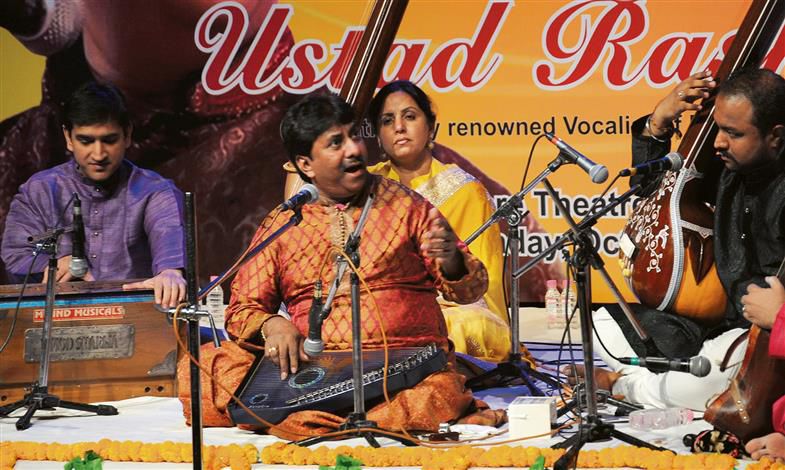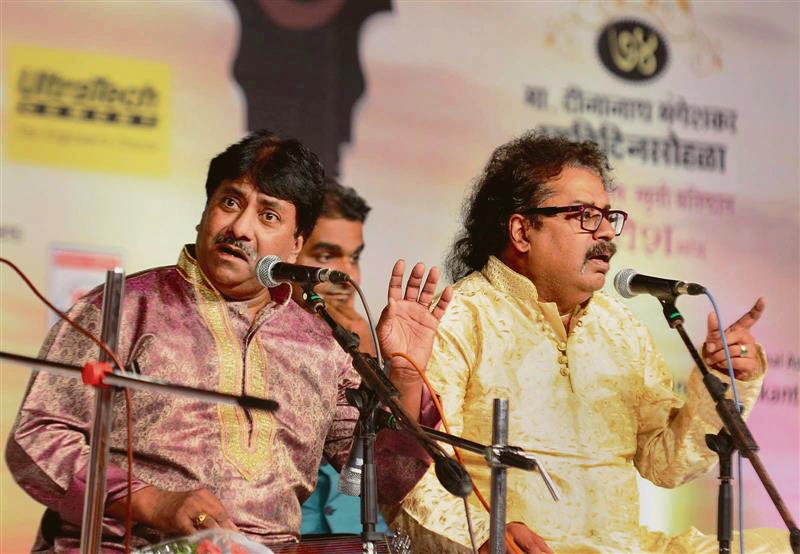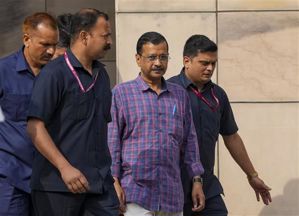
Robustness defined Ustad Rashid Ali despite the characteristic throwing of the voice towards upper registers. File photo: The Tribune
Sreevalsan Thiyyadi
The dusty plains of upper Ganges were poised for yet another monsoon when an illustrious musical family in Rohilkhand region got a child whose singing prowess was soon evident as a toddler. That apart, Rashid Khan was a reluctant vocalist during his childhood spent in north-central Uttar Pradesh. The boy’s grandfather had pioneered the Rampur-Sahaswan gharana, gifting Hindustani classical with breezy taans that connoisseurs likened to the “whoosh of light showers”. Hearsays about such grand innovations by Inayat Hussain Khan (1849-1919) took time to actually impress the best promise down the third generation in the ustad’s household. For, Rashid’s childhood passions in a sleepy Badaun were cricket and kabaddi.
Not that outdoor games alone interested the kid in the 1970s. Rashid would hum film songs, pepped by Mohammed Rafi’s popular numbers. At four, he lost his mother. The elders chose to shift him to Bombay, where his uncle Ghulam Mustafa Khan had debuted as a playback singer the year Rashid was born in 1968. Mustafa (1931-2021), primarily a khayaal exponent, groomed the little nephew more as a potential tabla player. The bols and rolls on the hand-drums further sickened the boy after his classes at a nearby English-medium school. In less than a year, he returned to Badaun.

At the ancestral home, granduncle Nissar Hussain Khan gave Rashid rigorous drills around Bhairav. Sa-ni-dha-pa, Ma-pa-dha-ni and similar sol-fa permutations of the morning raga would spill on to late evenings. The monotony of prolonged sargam exercises intensified Rashid’s aversion to music even as he grasped the lessons well. Then came a real breakthrough. Some 1,300 km southeast of Badaun, the ITC founded its Sangeet Research Academy (SRA) at Calcutta in 1978. Nissar Hussain took the boy to the metropolis and eventually joined the nascent institution as a teacher. A concert Rashid happened to give in its premises proved to be a game-changer.
“I was bowled over by the size of the crowd. The listeners featured quite a few VIPs too,” Rashid would recall. In fact, the preteenager’s presentation was succeeded by Ravi Shankar’s sitar. Rashid rendered ‘Lage tose naina pritam’ in the early-afternoon Patdeep, which had a lasting impression on the renowned instrumentalist. Whenever he visited Nissar Hussain, Ravi Shankar would call in Rashid to sample the vocals of the youth, now a frontline student at SRA. “Practise more,” the guest would say encouragingly, slinging an arm around the lad’s shoulder.
Meteoric aaroh
Just into his 20s, Rashid Khan had pretty well arrived on the scene. Lean-faced and mostly with a drooping posture on the dais, Rashid’s Purya or Sohini would flow out like a meandering river in sunset hour, as if narrating his own transformation of a lava-like life into cool beads finally coasting towards placidity. Those salad days ignited his talent with a rare blend of dynamics though the body language betrayed his shyness. Toothy utterances below a thick moustache went on to wane as his signature looks once Rashid, in his late 30s, gained weight as also virtuosity. Yet, no amount of perceived flashiness spoiled the meditative essence of his artistry.
All the same, Rashid made efforts to avenge for some of the wounds his pride had suffered. At age 29, he sought to sit in a corner of the ticketed gathering at Dover Lane Music Conference in the Bengal capital when a key organiser brusquely told him to leave. It didn’t take many editions for the prestigious annual event to invite Rashid. “My date came during a Paris tour,” the star would trail off with a smirk of victory. “I said I need to be flown to Calcutta and, the next day, back to France. The demand was accepted.”
The 1997 concert that happened to serve insult to Rashid was of Bhimsen Joshi. Sweetly ironical, considering that the icon later described Rashid as the “future” of Hindustani vocals. More so, when “Panditji”, as Rashid used to refer to the Kirana titan, was miserly in his praise for colleagues. The two used to sing together occasionally — a Todi bandish for Doordarshan in the early 2000s being a hit. “I knew the jugalbandi would be exemplary,” sitar master Vilayat Khan had remarked as the anchor. “You can see a lot of mutual affection and respect.” Besides Vilayat Khan, top instrumentalists such as Ali Akbar Khan and Nikhil Banerjee used to shower love on Rashid.
Notwithstanding the mentors, Rashid used to aver that he was nobody’s protégé per se. Frequently, in his remarks about khayaal, he would mention admiringly about Amir Khan. The Indore gharana founder’s sargam was “unique”, Rashid would say, yet reiterate that his own swara patterns were a spin-off from his formative riyaaz in Badaun. “My taans have evolved out of my sargam coaching. They developed within me,” he would point out. “In any case, ‘Absorb all good elements’ had been the refrain of my gurus.”
To Rashid, Rampur-Sahaswan lent itself to several kinds of flexibility. Influenced by Amir (1912-74), Rashid slowed the tempo of his opening vilambit, but this least implied a change of gharana. Robustness defined his performance despite its characteristic throwing of the voice towards upper registers. Sharing a certain habit of Nissar Hussain, the grand-nephew would recall how the Ustad sped up his taranas during train travels to the rhythmic rail-beats. Taking the trip further forward, Rashid’s sonority offered him trysts with Bollywood, just as his uncle Mustafa. In a career of two decades, Rashid sang no less than 26 numbers in 19 Hindi films. ‘Aaoge jab tum’ particularly drew his satisfaction, with Sandesh Shandilya as the music director for ‘Jab We Met’ (2007).
When it comes to teaching, good students “help you learn more”. Every era brings in an exceptional artiste, who then scripts a new chapter in music, according to the maestro. Rashid Khan, who died last week aged 55, himself belonged to that league. The rains of his birthday month this July will miss the Malhar treat.
Join Whatsapp Channel of The Tribune for latest updates.


























